- Home
- Chris Wraight
Battle Of The Fang Page 30
Battle Of The Fang Read online
Page 30
And I need to kill. By Russ, I need to share my pain.
It had always been painful, ever since Russ had gone. There had been no explanation, no words of comfort.
One night, one midwinter’s night of storm-fury, the primarch had gone.
Leman Russ had left without saying why, charging into the void as he always did, heedless of the danger, heedless of those he left behind.
Bjorn whirled on his axis, crunching a Rubric Marine in his claw and throwing it into the air. When the body landed the beasts got to work, slicing into the hollow armour with their rending claws. By then Bjorn had taken on another two targets, blasting holes in ceramite and slicing through ribs of banded steel.
Did you know how angry that made me, that you never said why?
He had fought differently when he’d been alive. Back then, many lifetimes ago, he’d raced into battle with Godsmote, and Oje, and Two-Blade, and their wyrds had been coiled together tighter than throttle-twine. The Wolves around him now cut threads with the same peerless majesty as those of old, but it wasn’t the same. Bjorn knew the galaxy had aged, and he had not. He had no place here, not with the hot-blooded whelps who had inherited the mantle of the Aett.
I think you knew. You knew I would hate this. You knew every moment would be torture for me.
A sorcerer came into cast-range, half-obscured by ranks of Traitor Marines. He began to kindle maleficarum in the palms of his hands, conjuring balls of flame, ready to hurl into combat.
Bjorn registered the witch with contempt. Or, at least, his mind felt contempt. It was possible that the emotion translated into some physical pattern on his ruined face, submerged in fluid and withered by the pitiless weight of ages, but such subtlety certainly didn’t register on his face-guard.
And that, above all, makes me believe you kept the truth from me for a reason.
He took a single, bracing stride, rocked back and detonated his cannon. The sorcerer disappeared beneath a tidal wave of explosions, burning and ripping up. Bjorn kept firing, kept funnelling all his hatred and weariness and anguish at the crippled Traitor. When he finally stopped, finally turning to find more prey, his victim’s armour was little more than a super-hot puddle of sizzling hydrocarbons.
This anger, this betrayal. It keeps me alive.
The beasts stayed close by his heels, tearing the head off any enemy who got too close, but allowing Bjorn to bring his close-combat weapon to bear if needed. They darted and raced through the melee as they’d been designed to, matching the supernatural agility of the Wolves beside them. Bjorn knew how they were capable of such things, and why they’d been made. Very few others did.
I loved you as none of your sons loved you. You knew this.
Absently, Bjorn noticed one of his fellow Dreadnoughts, Hrothgar, suffering under a concerted onslaught from a whole squad of Rubric Marines, backed up by the indomitable presence of a Cataphract. Irritated by the distraction, he spun round, got a firing solution and took the war machine’s head off. Even before the bronze skull had hit the ground he was back into the attack, plunging his claw-blades into fresh meat.
My thanks, lord, voxed Hrothgar.
Bjorn didn’t reply. He was busy killing. That was all he ever did. It was either stasis, or killing. Unconsciousness, or fury.
You knew I would hate you. You, who left me to this fate. I would have pierced the veils of reality with you, marched with you to destiny, stood beside you against the enemy you knew was waiting.
His cannon bellowed out, laying waste to rows of the enemy. He was invincible, titanic, massive, far superior to any foe before him. Nothing the Thousand Sons had brought to face him had even remotely troubled him. Just as on Prospero, Bjorn was unmatched.
Perhaps – perhaps – this was how a primarch felt in combat.
And I know what you were doing. You birthed this hate in me, as potent as the love I still cannot shake.
If he’d possessed tear-glands, he would have wept. If he’d possessed a jawline, it would have been clenched into an eternal grimace of horror. If he’d possessed vocal cords, they would have trembled in a howl of utter, soul-burning anguish.
For hate is the most powerful drive in the universe, and you needed to give me such power that the Wolves would never be without a defender.
But Bjorn had none of these things. All he had was the fury of the favoured son rejected by his father. And, as the galaxy knew from bitter experience, that fury held nothing but the promise of death, and devastation, and blood raining down like the tears of heaven.
Another attack had been repelled. Wearily, the defenders at the Fangthane let their guns fall silent, preparing to count the dead and wounded and haul them from the front line. Though the fighting had stopped for a short while, there was no pause in their labour. Squads of kaerls were rotated in the brief respite, with those having taken the brunt of the assault for longest being withdrawn and replaced by fresher troops. As the assault had ground on, a murderous procession of attack and counter-attack, all the mortals had gone without sleep, and even those being newly drafted to take up position had the heavy-limbed gaits of weary men. The habitual swagger of the Fenrisian kaerls had long gone, replaced with a blank, dogged defiance.
Morek had been on shift for thirteen hours by the time he was called back. A Wolf Guard gave him his orders. His armour was dented and scorched as if he’d waded through a lake of magma.
‘Rivenmaster,’ he’d barked, his booming voice distorted by a broken vox-unit. ‘What are you still doing on station?’
‘My duty,’ Morek had said, his voice trembling with fatigue, unable to think of anything else to say.
Then the Wolf Guard had pushed him roughly up the slope of the stairway toward the rear positions, past the lines of barricades and gun emplacements towards the open hall of the Fangthane.
‘Your duty is to obey the rotation patterns,’ he snarled. ‘Ensure your replacement is here before the next wave hits.’
So Morek had stumbled away from the front lines at last, hardly able to lift his head from his armour’s neck-guard, hardly able to hold his rifle in his hands.
He’d lost any awareness of how long the carnage had been going on for. The hours had bled into days, which had extended into a long train of horrifyingly brutal engagements and tense, exhausting waiting periods. He’d snatched some sleep where he could, but it had never been enough. He’d woken abruptly at one point during a lull in the fighting, screaming something about a horror lurking in the fleshmakers’ labs. Thankfully, fighting broke out almost immediately afterwards, dragging the exhausted kaerls’ attention to more pressing matters. Despite the lucky escape, his lack of control scared him.
As Morek passed through the rear defences, walking in the shadow of four massive gun turrets, he was only dimly aware of the movement all around him. Kaerls were everywhere, hauling crates of ammunition, armour or rations, dragging themselves back from the front like him or preparing to take up their positions in his place. Some still moved with a steady, dependable resolve. Others staggered as they marched, exhaustion evident in their movements.
None of them looked remotely likely to shirk their duty and seek a less dangerous station. Fenrisian rivens had no equivalent of the Imperial Guard Commissars. They weren’t needed. The very idea of trying to evade combat in order to achieve some short-lived safety was as alien to the deathworld’s psyche as charity.
As Morek emerged from the gun-lines and into the greater space of the hall beyond, he nearly stumbled into a heavy weapons squad hurrying to the front. Mumbling a curt apology, he backpedalled away from them, only to crash into a stack of dried-meat cases waiting to be doled out to the defenders. He fell clumsily to the floor, his legs giving out just as he tried to right himself.
For a moment, he stayed there, feeling the hard stone beneath his back, letting the temptation to rest – for a moment – sink into his bones.
Just for a minute. Just for two minutes. Then back on my feet.
The world reeled around him, losing focus, and he felt his tired lids flicker towards closing.
Then there was a massive presence looming over him. Some instinct told him that giving in to unconsciousness in front of it would be a terrible mistake, and he forced himself up on to his knees.
‘Your pardon, lord,’ he mumbled, trying not to scatter the cases around him any further as he rose.
To his astonishment, the giant before him extended a massive gauntlet. As he considered grasping it to haul himself up, Morek noticed that the ceramite wasn’t grey, but black.
His eyes lifted, passing over a scarred breastplate, festooned with the bones of animals. The helm face-mask was a skull, cracked open by a blade-impact and as coal-black as the rest of the battle-plate. The lenses glowed angrily, staining the cheek-guards like bloody tears.
‘Morek Karekborn?’ came the dry, age-tempered voice of Thar Ariak Hraldir, the one they called Wyrmblade, the fleshmaker. ‘It is time, I think, that we spoke together.’
Morek gazed up into the skull-visage of the Wolf Priest. His fatigue seemed to fall away from him then. It was replaced, as he’d known it would be for so long, with the cold grip of fear.
‘As you command, lord,’ he replied, but his voice was as dry as embers.
Aphael stalked through the empty tunnels of the Hould. The battles at the two choke-points had been raging for days already, with no immediate sign of a breakthrough. He expected them to burn for many more days to come. The Dogs would be tenacious in defence. They had to be – there was nowhere for them to go.
That suited him fine. The purpose of the first wave assault was not just to inflict pain, but to clear the defenders from the heart of the Fang for long enough to destroy more of the wards against sorcery. That work was difficult and tiring, especially in his fevered state.
Aphael had continued to suffer from the flesh-change. Combat was only a partial release. In its absence, he’d become erratic, prone to violent mood-swings, incapable of making decisions calmly. He knew it was happening. As if observing himself from afar, he could see his mental processes disintegrating with every passing hour.
And now, a new presence had started to press on him, crowding out what control he still possessed. Something conscious was stirring, deep within his own mind. A sentience not his own had taken root within his thoughts and was gradually accruing more strength. Even as his body rebelled against him, his mind had begun to slip away too.
Once the inevitability of his destruction became clear, Aphael had passed through the familiar response pattern. Disbelief. Rage. Misery. Now he’d ended up in a dull kind of acceptance. There was nothing he could do to fight the process. Already his body and armour were intimately fused together, such that he knew he’d never be able to remove it. The only task remaining was to carry out his duties for as long as he could.
I will see the Dogs burn. After then, do whatever you wish with me. But I will not pass into oblivion until our retribution is complete. I will not.
Such bravado, he knew, was pointless. The Changer of Ways was not a power to be threatened or cajoled. And yet, the words brought a grain of comfort to him. He was still capable of defiance, at least verbally.
Aphael came to stand before another one of the wards. It had been placed at the intersection of four tunnels. The junction was a circular chamber with an empty fire-pit in the centre of it. The ward had been created on a stone pillar that rose from next to the pit. It was in the shape of an eye, scratched into the stone, with a jagged incision scored across it. There was human blood in the scratch, and a few runes carved underneath.
So simple. A child could have made something similar. And yet, the raw power bleeding from the symbols clamped down on his sorcery like a fist locked over a mouth. The Rune Priests, for all their clumsy misunderstanding of the warp, were adept at manipulating its signs. Somehow, as untutored and ignorant as they were, they had learned how to focus the parallel energies of the aether through the use of names, sigils and gestures. Created in such numbers, the wards of the Fang acted as a powerful dampener of sorcerous energy, such that even summoning the mildest of magicks was difficult and dangerous.
That had to end.
Aphael stood before the ward, wearily preparing for the rite that would destroy it. Around him, his guard of six rubricae took up stations in the chamber. The last slivers of flame in the fire-pit rippled out, plunging the space into complete darkness. Absently, Aphael blinked to adjust his helm lens filters.
It was only then that he saw the children. There were seven of them, huddled in the dark, rubbing up against one another like rats.
Despite everything, despite all his inner turmoil, despite the need for swift clearance of the wards, Aphael smiled.
He turned his bronze head toward them. In the perfect dark, his helm picked out the childrens’ outlines in the fuzzy green of night-vision. He saw their terrified faces, their tiny fingers scrabbling at the rock walls.
How had they been left behind in the Hould? Did the barbarians of Fenris care so little for their own young that they abandoned them to the enemy? Or had some terrible mistake been made?
In either case, it gave Aphael a rare chance to exercise his skills in the cause of genuine pleasure. Their deaths would be lingering, a fitting punishment for all the hurt inflicted on his Legion by the Dogs of Fenris.
‘Feel free to scream, little ones,’ purred Aphael, withdrawing his blade and picking his first victim. ‘There’s plenty of ti–’
Something hit him hard in the helmet, thrown with astonishing accuracy and poise. Then it exploded, rocking him back on his heels.
‘Fekke-hofud!’ yelled one of the whelps, darting past him and scampering into the dark.
Aphael roared with rage, and swung his sword down quickly, aiming to scythe the little horror down as he ran. The stroke was knocked off-course by another grenade going off, this time hurled at his midriff.
They’re armed! They were left here – with weapons!
‘Kill them all!’ shouted Aphael, whirling round and reaching to grasp one of the fast-moving brats. He grabbed the bolt pistol at his waist and pulled it free. By then the rubricae had swung into action, grasping for the children as ineffectually as he did.
They were as fast as rats, and just as at home in the tunnels. More grenades were discharged, including one that actually took down a Rubric Marine, exploding in a flurry of frag-discharge into his face and dumping him on to the ground.
Then they were gone, darting down the corridor beyond like whelp-ghosts, leaping and laughing into the echoing dark.
Aphael swept his pistol up and released a torrent of rounds into the tunnel entrance. None of them connected. The urchins of the Fang, bred to a lifetime of darkness and survival expertise, were too fast, too wily, and too well-prepared.
The laughter died away. The downed rubricae regained its feet, looking all the more ridiculous for its very lack of embarrassment. It took up position again, as silent and serious as before.
There was no real harm done. For all their stealth and speed, the tunnel-rats had no means of hurting a Space Marine.
But it was humiliating. Deeply humiliating.
‘I loathe this world!’ roared Aphael, whirling round to the ward-pillar and letting his anger ignite his staff.
The shaft of iron exploded into ruinous, terrible light, banishing the darkness and sending flickering beams of aetheric electricity shooting in all directions. The blazing inferno crackled against the ward, sucked towards it as if by magnetism. The symbol resisted for a moment, glowing an angry red, soaking up the horrific amount of energy pouring from the sorcerer’s staff.
Then, inevitably, it broke. A hairline crack ran down the image, shattering the unity of the device and interrupting the runic text beneath. The frigid air rippled with a sudden, searing heat, and then sank back into cold darkness.
Aphael let the power drain back into his staff, panting heavily. All around him, the rubricae looked on inscrutably.
The ward was broken, and Aphael felt his power instantly magnify. The sense of relief was fleeting. He was humbled, angry and frustrated. There were kilometres of tunnels still to work through, all of them riddled with traps for the unwary.
This was menial work, fit for acolytes, not for commanders. If any of his subordinate pyrae had been skilled enough to take his place, he’d happily have drafted them into ward-destruction instead of him.
But they weren’t, and in any case the greater mass of sorcerers were needed to shepherd the Rubric Marines into combat.
Damn Ahriman. He’s made us into a Legion of fools, stumbling around with our puppets in tow.
‘Follow,’ he muttered, striding out of the chamber and into the next tunnel. The rubricae smoothly moved to comply. As he went, Aphael could feel the flesh-change accelerating, encouraged by his outburst of anger.
Time was running out, slipping like sand through his fingers, racing towards the horror he knew was waiting. It would not be long now. Not long at all.
Wyrmblade led Morek far away from the stairway, across the broad floor of the Fangthane and under the feet of the Russ statue. As they went, the air was filled with the trundle of supply transports, the cries of huskaerls ordering their troops back into position, the distant thud of fighting elsewhere in the massive expanse of the Aett. No one gave the Wolf Priest and his mortal hanger-on a second glance.
Morek felt slightly aggrieved about that. If he was going to his death, it would have been nice for someone, just one person, to have cast a sympathetic look in his direction. But, of course, they had no way of knowing what Wyrmblade’s business with Morek was. And even if they had, would it have changed anything? Was the power of the Wolf Priests so absolute that there were no sanctions, at all, on what they did with their mortal charges?

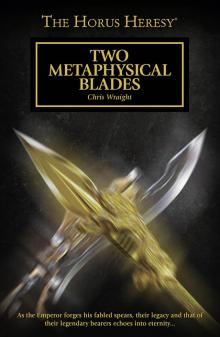 Two Metaphysical Blades
Two Metaphysical Blades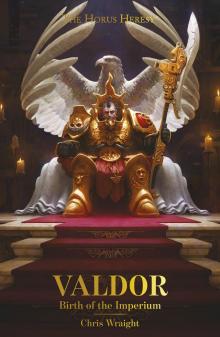 Valdor: Birth of the Imperium
Valdor: Birth of the Imperium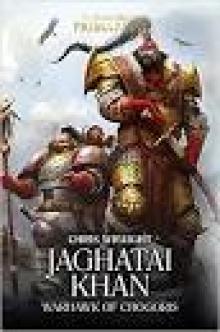 JAGHATAI KHAN WARHAWK OF CHOGORIS
JAGHATAI KHAN WARHAWK OF CHOGORIS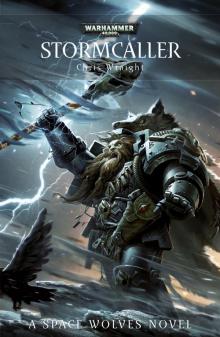 Stormcaller
Stormcaller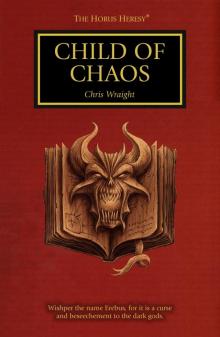 Child of Chaos
Child of Chaos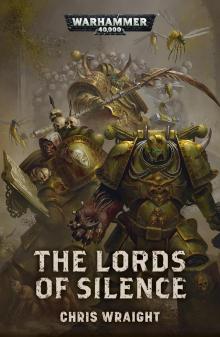 The Lords of Silence
The Lords of Silence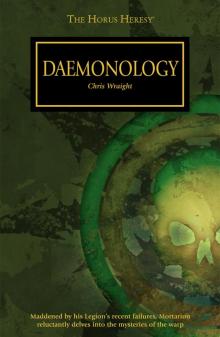 Daemonology
Daemonology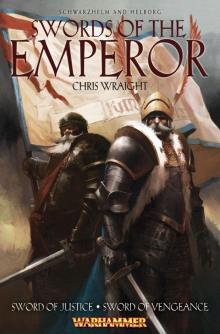 Swords of the Emperor
Swords of the Emperor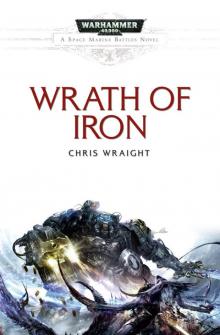 Wrath of Iron
Wrath of Iron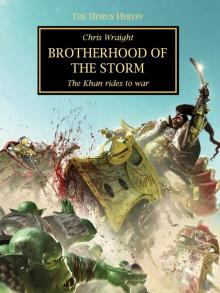 Brothers of the Storm
Brothers of the Storm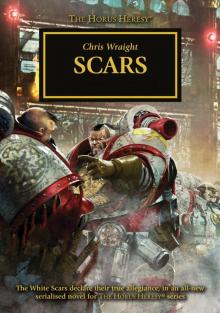 Horus Heresy: Scars
Horus Heresy: Scars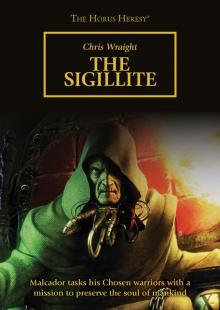 The Sigillite
The Sigillite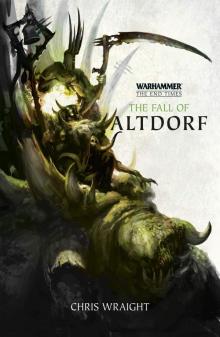 The End Times | The Fall of Altdorf
The End Times | The Fall of Altdorf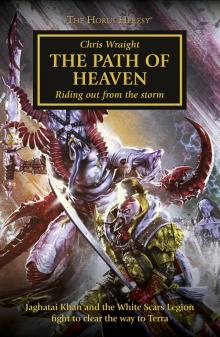 The Path of Heaven
The Path of Heaven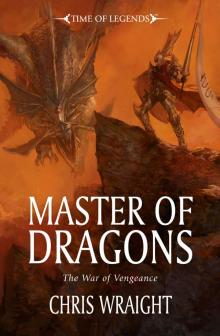 Master of Dragons
Master of Dragons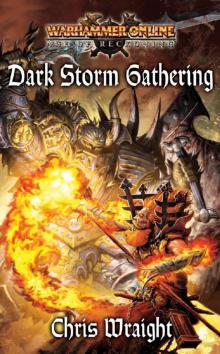 WH-Warhammer Online-Age of Reckoning 02(R)-Dark Storm Gathering
WH-Warhammer Online-Age of Reckoning 02(R)-Dark Storm Gathering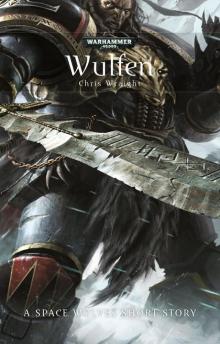 Wulfen
Wulfen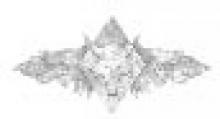 Battle Of The Fang
Battle Of The Fang Onyx
Onyx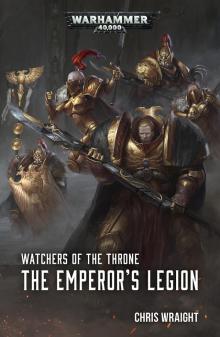 Watchers of the Throne: The Emperor’s Legion
Watchers of the Throne: The Emperor’s Legion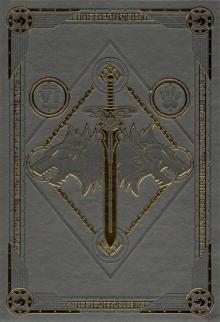 Leman Russ: The Great Wolf
Leman Russ: The Great Wolf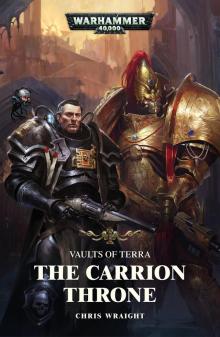 Vaults of Terra: The Carrion Throne
Vaults of Terra: The Carrion Throne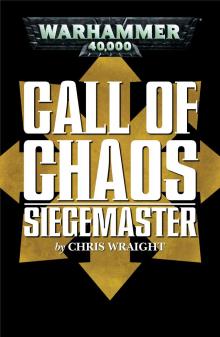 Siegemaster
Siegemaster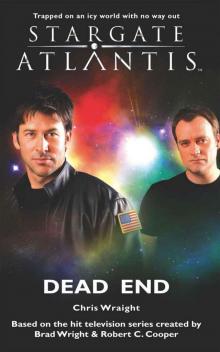 STARGATE ATLANTIS: Dead End
STARGATE ATLANTIS: Dead End Scars
Scars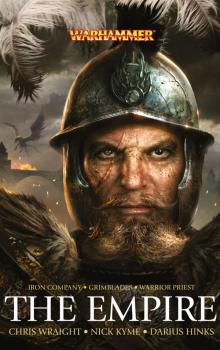 The Empire Omnibus
The Empire Omnibus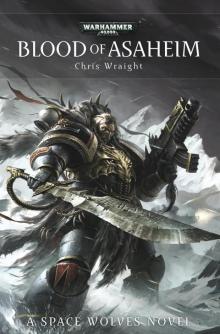 Blood of Asaheim
Blood of Asaheim